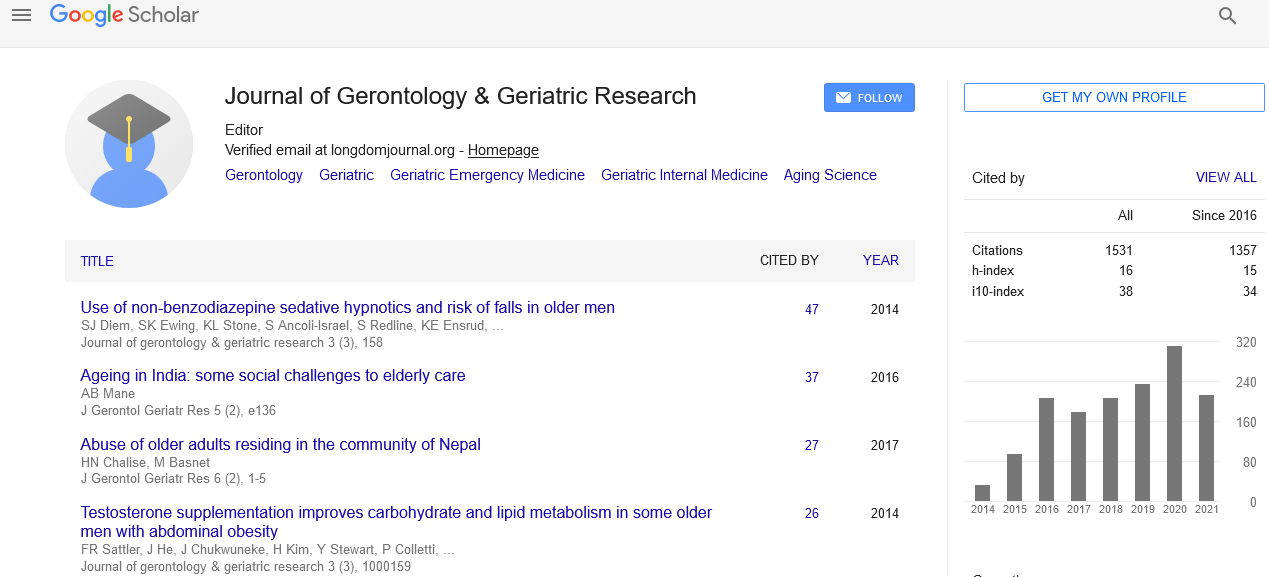PMC/PubMed Indexed Articles
Indexed In
- Open J Gate
- Genamics JournalSeek
- SafetyLit
- RefSeek
- Hamdard University
- EBSCO A-Z
- OCLC- WorldCat
- Publons
- Geneva Foundation for Medical Education and Research
- Euro Pub
- Google Scholar
Useful Links
Share This Page
Journal Flyer

Open Access Journals
- Agri and Aquaculture
- Biochemistry
- Bioinformatics & Systems Biology
- Business & Management
- Chemistry
- Clinical Sciences
- Engineering
- Food & Nutrition
- General Science
- Genetics & Molecular Biology
- Immunology & Microbiology
- Medical Sciences
- Neuroscience & Psychology
- Nursing & Health Care
- Pharmaceutical Sciences
SHOULD WE SCREEN FOR COGNITIVE DECLINE AND DEMENTIA? OLD PROBLEMS AND NEW INSTRUMENTS
4th International Conference on Geriatrics & Gerontological Nursing
October 3-4, 2016 | London, UK
Laura Calza
University of Bologna, Italy
Scientific Tracks Abstracts: J Gerontol Geriat Res
Abstract:
Due to increased life expectancy, the prevalence of cognitive decline related to neurodegenerative diseases and to nonneurological conditions is increasing in western countries. As with other diseases, the burden might be reduced through personalized interventions delivered in early stages of the disease. Thus, there is an increasing demand, from both social and health care systems, for instruments and strategies recognize cognitive decline, and possibly distinguishes the precursor of serious neurodegeneration from �??benign senile forgetfulness�?� or the temporary consequences of illness or trauma. However, this goal faces both technical and ethical issues. In this presentation I will discuss the followings: (i) re-definition of cognitive decline and its relationship with frailty definitions, starting from the recent work of international consensus groups for presymptomatic Alzheimer disease recognition; (ii) ethical problems concerning anonymous and personalized cognitive screening and the need for appropriate counselling; (iii) the need for more sensitive and specific tools to detect and distinguish pathological levels of cognitive decline and delineate the contribution of non-pathological decline to accumulated frailty impacts and (iv) the potential of the language domain and spontaneous speech analyses. Two novel ICT instruments for fast testing of the cognitive performance will be presented. The first one intends to explore in a 15min test different cognitive domains included or not in conventional dementia screening programs (amnestic, temporal orientation, immediate and delayed topographic memory, visual attention and executive functioning, constructive abilities, visual attention, object recognition, inhibition abilities, visuospatial skills), to provide a �??warning index�?� for further neuropsychiatric investigations. The second one is based on the assessment of verbal and nonverbal abilities through the analysis of the spontaneous discourse, which allows study of the language used in a real-world context, through automatic computerized and statistical techniques from Natural Language Processing. This system will conduct a quantitative analysis of spoken texts, computing acoustic/ prosodic, lexical, morpho-syntactic and semantic characteristics.
Biography :
Laura Calza is a professor of Embryology, Regenerative Medicine and Cognitive Sciences at University of Bologna. She is the Director of the Health Sciences and Technologies - Interdepartmental Center for Industrial Research (HST-ICIR) at University of Bologna. Laura is the president of the scientific and technical board of the Montecatone Rehabilitation Institute for spine and brain injury. She is the scientific advisor of the Life Science Platform at High Technology Network for Emilia Romagna Region. She is the scientific director of IRET Foundation, Ozzano Emilia, Italy. She is the founder of TransMed Research srl, Ozzano Emilia, Italy. Laura is one of the members of the Neuroscience Society, and Alzheimer’s Association International Society to Advance Alzheimer’s Research and Treatment (ISTAART).
Email: laura.calza@unibo.it


